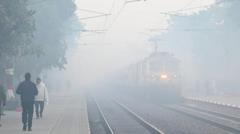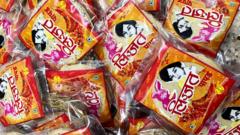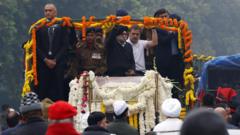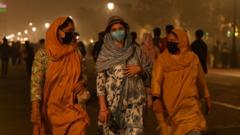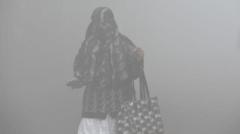Air quality in Delhi has seen a significant decline, with recent data indicating pollution levels that are alarmingly high. Just last week, various locations across the Indian capital recorded pollution concentrations 25 to 30 times above safe limits as recommended by the World Health Organization (WHO). Experts predict the air quality will continue to deteriorate amidst worsening weather conditions, the use of firecrackers during the Diwali festival, and the persistent practice of burning crop residues from nearby agricultural states.
Delhi's Air Quality Plummets to Hazardous Levels Amid Festive Season
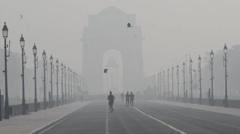
Delhi's Air Quality Plummets to Hazardous Levels Amid Festive Season
Delhi's air pollution has reached critical levels, prompting alarm over health impacts and necessary action amid seasonal challenges.
Every winter, Delhi and northern Indian cities grapple with severe air pollution, disrupting daily activities and enforcing temporary school and business closures. According to data from the government-operated Safar website, the concentration of PM 2.5—tiny particulate matter harmful to lung health—peaked at around 350 micrograms per cubic meter in certain city sections recently. Air quality is classified as very poor when PM 2.5 levels hit 300 to 400 and as severe when they reach from 400 to 500.
This annual pollution crisis often results from a combination of smoke, dust, low wind speeds, and emissions from vehicles and industry, compounded by stubble burning carried out by farmers in Punjab and Haryana. These farmers have expressed the need for more financial and technical resources to adopt alternative practices, but government assistance has been inadequate in yielding real change.
As Diwali approaches this Thursday, the Delhi government has reiterated a ban on the manufacturing, storage, and sale of fireworks, a measure aimed at mitigating air quality deterioration during this festive time. Historically, however, such bans have fallen short as many resort to sourcing fireworks from other states.
Additionally, the Delhi authorities have activated the Graded Response Action Plan (GRAP) to address the looming pollution crisis. This plan includes bans on coal and wood usage, along with restrictions on diesel generators for non-urgent tasks. Residents have been urged to remain indoors and to utilize public transportation options to reduce vehicle emissions.
This annual pollution crisis often results from a combination of smoke, dust, low wind speeds, and emissions from vehicles and industry, compounded by stubble burning carried out by farmers in Punjab and Haryana. These farmers have expressed the need for more financial and technical resources to adopt alternative practices, but government assistance has been inadequate in yielding real change.
As Diwali approaches this Thursday, the Delhi government has reiterated a ban on the manufacturing, storage, and sale of fireworks, a measure aimed at mitigating air quality deterioration during this festive time. Historically, however, such bans have fallen short as many resort to sourcing fireworks from other states.
Additionally, the Delhi authorities have activated the Graded Response Action Plan (GRAP) to address the looming pollution crisis. This plan includes bans on coal and wood usage, along with restrictions on diesel generators for non-urgent tasks. Residents have been urged to remain indoors and to utilize public transportation options to reduce vehicle emissions.







